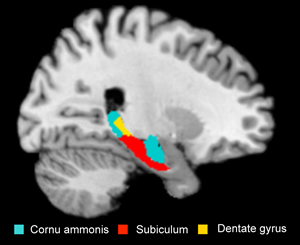A University of Toronto study shows that when formerly depressed people experience mild states of sadness, their brain’s response can predict if they will become depressed again.
“Part of what makes depression such a devastating disease is the high rate of relapse,” says Norman Farb, a PhD psychology student and lead author of the study. “However, the fact that some patients are able to fully maintain their recovery suggests the possibility that different responses to the type of emotional challenges encountered in everyday life could reduce the chance of relapse.”
Farb and his team showed 16 formerly depressed patients sad movie clips and tracked their brain activity using functional magnetic resonance imaging (fMRI). Sixteen months later, nine of the 16 patients had relapsed into depression. The researchers compared the brain activity of relapsing patients against those who remained healthy and against another group of people who had never been depressed. [continue reading…]
Young drivers who experience anxiety and depression are more likely to take risks on the road, according to a new study by Queensland University of Technology (QUT).
The results of the study led by Bridie Scott-Parker, from QUT’s Centre for Accident Research and Road Safety – Queensland (CARRS-Q), have been published in the international journal Injury Prevention today.
Mrs Scott-Parker said the study of more than 760 young drivers, who were on their provisional licence, found anxiety and depression accounted for 8.5 per cent of the risky driving behaviour reported by these young adults. [continue reading…]
Published: April 27, 2011

Depressive patients carrying the risk allele show volume reduction in certain regions of the hippocampus. Photo: MPI for Psychiatry
Max Planck scientists uncover surprising genetic links. Scientists from the Max Planck Institute for Psychiatry in Munich have compared the genomes of a total of 4,088 patients and 11,001 healthy control subjects from all over the world and identified a new risk gene variant for depression.
They were able to show for the first time that physiologically measurable changes can be observed in the brains of healthy carriers of this risk allele. Those changes affect a transporter protein involved in the production of an important neuronal transmitter. Given that traditional drugs interact with similar transporter molecules, the researchers are pinning great hopes on this factor as the target structure of future antidepressant medication. Scientists throughout the world have been trying to identify the genetic causes of depression for many years. [continue reading…]
Published: April 25, 2011

Image Credit: iStockphoto
Thinking happy thoughts, focusing on the good and downplaying the bad is believed to accelerate recovery from depression, bolster resilience during a crisis and improve overall mental health. But a new study by University of Washington psychologists reveals that pursuing happiness may not be beneficial across all cultures.
In a survey of college students, Asian respondents showed no relationship between positive emotions and levels of stress and depression. For European-American participants, however, the more stress and depression they felt, the fewer positive emotions they reported.
The study indicates that psychotherapies emphasizing positive emotions, which can relieve stress and depression in white populations, may not work for Asians, who make up 60 percent of the world population. [continue reading…]


